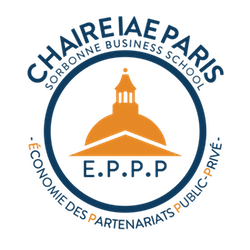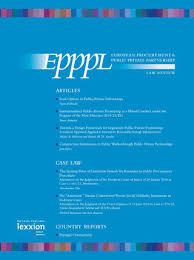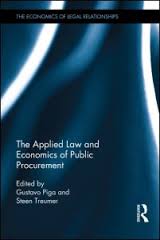Posts de Stéphane Saussier
Une estimation des coûts d’efficience des tarifs actuels des services publics de l’eau en France
Un résultat communément accepté dans la littérature sur la régulation des services publics (Coase [1946]) est que l’efficience du marché exige un recours à des tarifs binômes avec d’une part un prix marginal égal au coût marginal et d’autre part un prix fixe correspondant à la part de coûts fixes prise en charge par chaque abonné. En France, les usagers des services d’eau payent un prix marginal qui est en moyenne 8% plus élevé que le coût marginal. Selon nos estimations de l’élasticité-prix, qui sont similaires à celles obtenues dans les précédentes études, les coûts d’efficience représentent une perte de près de 8 millions d’euros en 2008. Même si la distorsion demeure relativement faible, les consommateurs pourraient bénéficier de ces gains d’efficience.
Gestion Publique ou Privée? Un benchmarking des services d’eau en France
Revue d’Economie Industrielle, trimestre 4, 2012
Résumé: Nous utilisons une méthode d’Analyse par Enveloppe de Données (DEA) ainsi qu’une méthode d’Analyse par Frontière Stochastique (SFA) pour mesurer l’efficacité relative de 177 services d’eau en France, en 2009. Ces services peuvent être gérés directement par les communes (régies) ou être délégués à des opérateurs privés. L’utilisation de ces deux outils de benchmarking nous permet de distinguer la part de l’inefficience relative des services provenant de l’inefficience managériale, du contexte opérationnel et des bruits statistiques. Nos résultats indiquent tout d’abord que les opérateurs privés opèrent dans des environnements plus difficiles. Après correction de cet environnement d’exploitation, les services d’eau délégués demeurent, en moyenne, légèrement moins efficients en comparaison des régies. Cependant, cette faible différence se dissipe lorsque les performances relatives sont mesurées économétriquement.
Efficiency in the Public and Private French Water Utilities: Prospects for Benchmarking
Numéro: 2013-1 Efficiency in the Public and Private French Water Utilities: Prospects for Benchmarking Aude Le Lannier and Simon Porcher (Chaire EPPP) Abstract: This paper uses a Data Envelopment Analysis (DEA) and a Stochastic Frontier Analysis (SFA) to assess the relative technical efficiency of 177 decision making units in the water supply sector in France in 2009.…
Lire la suiteNegotiated Procedures Overrated ? Evidence from France Questions the Commission’s Approach in the Latest Procurement Reforms
Abstract :
The new European legislative proposals on public procurement suggest introducing the unconditional possibility for public buyers to use negotiated procedures with publication. Such procedures have been available to French public buyers for contracts up to €5 million since 2004. We use an original and comprehensive database from Paris Habitat-OPH, the largest social housing constructor in Europe, to empirically assess the impact of negotiated procedures on price. After satisfyingly dealing with the endogeneity issue associated with the use of negotiated procedures, we find that such procedures significantly decreased the received bids by close to 26 % (the coefficient drops to 15.7% when excluding « abnormally » high offers). Some drivers of the positive effects we observe are highlighted, enabling us to derive practical implications of these results for public policies.
Organizing Prisons through Public-Private Partnerships: a Cross-Country Investigation
Brazilian Administration Review, January-March, Volume 10, Number 1, p.100-120, (2013)
Abstract: In this paper, we analyze the private participation in prison services in three countries: Brazil, France, and the United States. We highlight striking differences in efficiency between these countries and argue that the explanation for these differences is not restricted to the way property rights are distributed (i.e. public vs. private management). Instead, our analysis suggests that understanding those differences also requires an analysis of the incentives provided by contractual choices as well as decision and revenue rights distribution and institutional constraints. The theoretical literature usually analyzes these blocks separately, and often focuses on property rights distribution. We argue that an efficient arrangement is the result of the way these elements are combined, giving rise to a distinctive governance structure.
Lire la suiteSimon PORCHER
Organizational Choices, Efficiency and Equity in Local Public Services :the Case of French Water Supply Décembre 2012
Lire la suiteInnovation and regulatory outcomes: Evidence from the public-private contracts for water supply in France
Numéro: 2012-11 Innovation and regulatory outcomes: Evidence from the public-private contracts for water supply in France Freddy Huet (Université de la Réunion) and Simon Porcher (IAE Paris) Abstract: One of the most important pitfalls associated with public-private partnership schemes (PPPs) conducted in natural monopoly industries is the difficulty of replacing the winning firm after a contract…
Lire la suiteRetendering a contract for breach of procurement rules or changes to contract
The Applied Law and Economics of Public Procurement
Edited by Gustavo Piga, Steen Treumer
Published 6th September 2012 by Routledge – 308 pages
This book explores Public Procurement novelties and challenges in an interdisciplinary way. The process whereby the public sector awards contracts to companies for the supply of works, goods or services is a powerful instrument to ensure the achievement of new public goals as well as an efficient use of public funds. This book brings together the papers that have been presented during the « First Symposium on Public Procurement », a conference held in Rome last summer and to be repeated again yearly.
As Public Procurement touches on many fields (law, economics, political science, engineering) the editors have used an interdisciplinary approach to discuss four main topics of interest which represent the four different parts in which this book is divided:
- Competitive dialogue and contractual design fostering innovation and need analysis,
- Separation of selection and award criteria, including exclusion of reputation indicators like references to experience, performance and CV’s from award criteria,
- Retendering a contract for breach of procurement rules or changes to contract (contract execution),
- Set-asides for small and medium firms, as in the USA system with the Small Business Act that reserves shares of tenders to SMEs only.
More information here
Lire la suite
Une estimation des coûts d’efficience des tarifs actuels des services publics de l’eau en France
Numéro: 2012-10 Une estimation des coûts d’efficience des tarifs actuels des services publics de l’eau en France Simon Porcher (IAE Paris) Abstract: Un résultat communément accepté dans la littérature sur la régulation des services publics (Coase [1946]) est que l’efficience du marché exige un recours à des tarifs binômes avec d’une part un prix marginal égal au…
Lire la suiteDiscretion and Efficiency in Public Procurement: Evidence from France
Numéro: 2012-9 Lisa Chever et John Moore (Chaire EPPP) Abstract : The new European legislative proposals on public procurement suggest widening the possibility for public buyers to use negotiated procedures with publication. Such procedures have been available in France for work contracts up to 5 million euros since 2004. Yet, their impact on public procurement efficiency is still to be assessed. We…
Lire la suite





